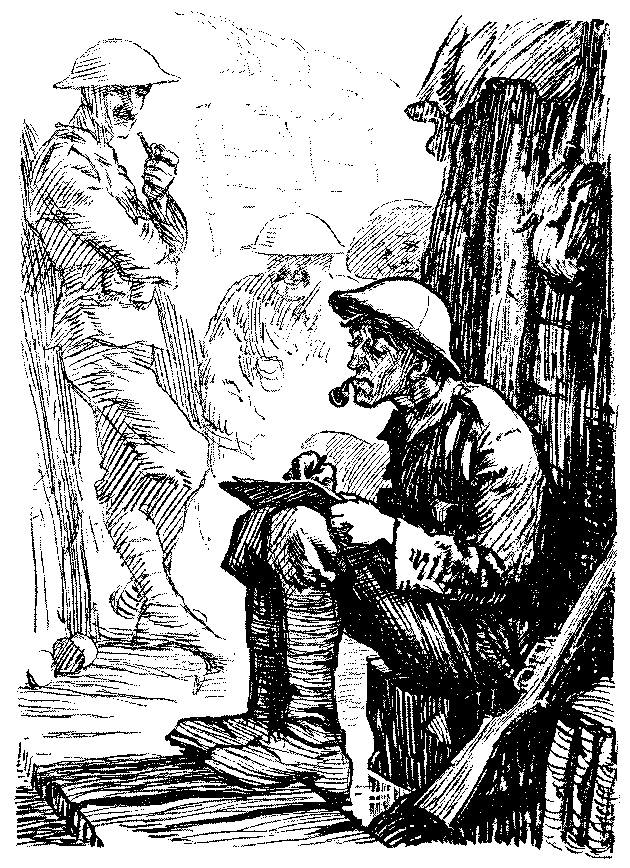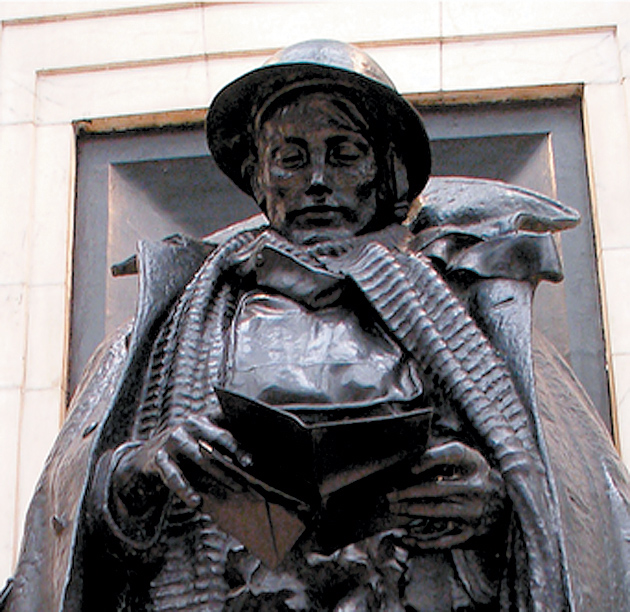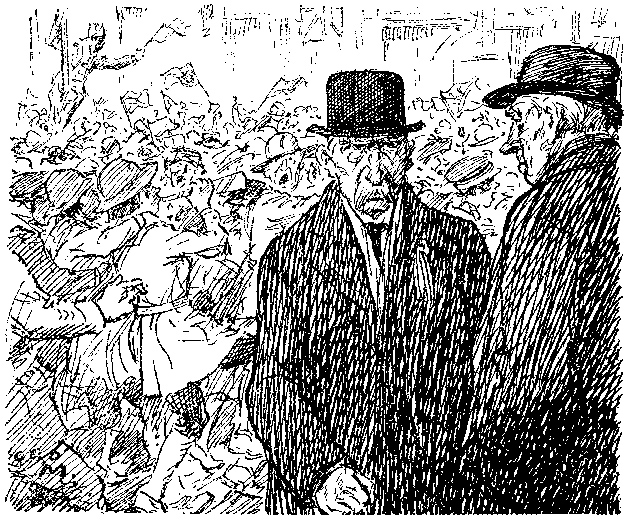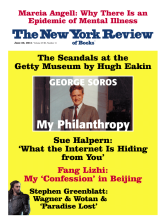1.
One of the unlikelier books in the house where I grew up was Mr. Punch’s History of the Great War. For us, “the war” meant the one that ended in 1945, in which our parents had served and in whose shadow we lived, and for the moment it had eclipsed the previous war. But as a schoolboy in the early 1960s I began to read the history of that war understandably called “Great” at the time, and also its “war poets,” Edmund Blunden, Robert Graves, Siegfried Sassoon, and the greatest, Wilfred Owen. He was killed days before the Armistice in November 1918, but the others survived to write memoirs of the war, all published around ten years after it ended: Blunden’s Undertones of War, Graves’s Good-bye to All That, Sassoon’s Memoirs of an Infantry Officer. These are the books that have since conditioned our view of the Western Front, with all its horror, squalor, and futility.

And that was what made Mr. Punch’s squat green quarto so jarringly incongruous. As its name said, it was a wartime anthology from Punch, the supposedly humorous weekly (which we certainly didn’t take at home; the book must have been bought by my mother’s father when first published in 1919). It condenses vigorous and sarcastic commentaries, sneering at the Irish, pacifists, and other favorite targets (“Mr Winston Churchill, the greatest of our quick-change political artists”), with cartoons amid the text. You would expect the bluff patriotism, but not the breezy tone, war as boisterous lark. One Punch cartoon shows an infantry officer approaching a deserted pile of rubble and saying, “My village, I think?” to another officer, who replies, “Sorry, old thing. I took it half-an-hour ago.”
That appeared in April 1917. The coming July would see the start of the enormous, pointless bloodletting of Passchendaele, and the previous summer the British army had endured another indelible horror. “Mr. Punch” couldn’t overlook it, although he is blusteringly evasive. The latest offensive had seen “substantial gains,” he says in July 1916—quite falsely, since almost no ground had been taken—though with “heavy losses.” What that flat phrase meant is that the Battle of the Somme had begun on July 1, and 21,000 British soldiers were killed or mortally wounded during the first day. We have heard much about nearly 4,500 American deaths over eight years in Iraq; given respective populations, the present-day equivalent of that July 1 would be 280,000 GIs killed between dawn and dusk.
Since I first looked at those pages from Punch, the war has grown in our imagination. The rather trite stage satire Oh! What a Lovely War in 1963 was followed by the unforgettable BBC television documentary series The Great War in 1964, when survivors could still give their stark accounts, and much more. This fascination has crossed the Atlantic, as shown by two powerful and original new books by American writers. To End All Wars by Adam Hochschild recounts the war through a pattern of interwoven personal stories, which are turned into a polemic against war, while Michael Neiberg’s Dance of the Furies examines what has been a bitterly contentious subject ever since: how the war began.
2.
With the European powers building up great armaments amid an atmosphere of violence, that conflict might seem inevitable. There had been murderous little wars in the Balkans, and a rash of assassinations that, in the twenty years before Archduke Franz Ferdinand paid his ill-fated visit to Bosnia, had already disposed of a French president, three kings (of Italy, Portugal, and Greece), two Spanish prime ministers, and the empress of Austria. But nothing in history is preordained, and at the time war didn’t seem at all likely, not even for most of the month after the news of the archduke’s assassination came on June 28 from Sarajevo, a place few people had ever heard of. The rulers of Austria-Hungary wanted an opportunity to punish Serbia, but then it was “a wild little state,” said H.H. Asquith, the British prime minister, “for which nobody has a good word.” And the American ambassador in Berlin reported that no one thought the assassination “would have any effect on the world.”
When war did come, it was almost accidental, and with no popular clamor. In 1890, Helmuth von Moltke, the Prussian general, had said that “the age of cabinet war is behind us—all we have now is people’s war,” words that Churchill had borrowed even before 1914, adding presciently that democracy was more vindictive than autocracy and “the wars of peoples will be more terrible than the wars of kings.” But Neiberg argues that the Great War began as a “classic cabinet war,” brought about by the decisions—or sometimes indecision—of a handful of men. Like a row of falling dominoes, Russia backed Serbia, then Germany seized the opportunity to humble Russia but hoped to knock out its French ally first, with a long-prepared invasion that went through neutral Belgium and thus provoked reluctant British intervention.
Advertisement
Once the guns of August fired, sentiment throughout Europe was transformed: tribal loyalty confuted the Marxist faith that the masses had no fatherland, and each populace managed to believe that theirs was a righteous defensive war. Those poets would write later with fierce sorrow and pity, but that was far from the poetical mood at the beginning. Rupert Brooke saw his generation “as swimmers into cleanness leaping,/Glad from a world grown old and cold and weary,” while Julian Grenfell wrote “Into Battle,” much anthologized at the time but now even harder to stomach: “And he is dead who will not fight;/And who dies fighting has increase.” Both men were dead within a year.
And a year of horror it had been. We think of the later vast battles but, week by week, 1914 itself was by far the deadliest year of the war. When the Western Front settled down into its pattern of trenches, the line scarcely moved for years on end however much blood was shed: 19,500 square miles of French and Belgian territory were in German hands when 1915 began; by the end of the year, Allied forces had recaptured eight of them. But the earlier phase was more mobile, and even bloodier. A.J.P. Taylor wrote that July 1, 1916, the first day of that attack in the Somme valley east of the town of Albert, saw the greatest loss “suffered…by any army” in the war, but this is not so: on August 22, 1914, 27,000 French soldiers were killed. Look at French war memorials where the fallen are given by each year. A century ago Saint-Martin-de-Belleville in Savoy (which I know as a skier) was a farming village of a few hundred souls. Many men are listed on the memorial outside the Mairie, with chillingly few surnames: thirteen men called Jay, and twelve called Hudry—seven of them killed in 1914 alone.
Among the British dead in the early weeks was George Cecil, a subaltern in the Grenadier Guards, whose story is sketched into Hochschild’s collage. Violet Maxse had married Lord Edward Cecil (making her Lady Edward, to be pedantic, rather than “Lady Violet,” as Hochschild has it), one of the gifted children of Lord Salisbury, Queen Victoria’s last prime minister, and a soldier turned imperial administrator. Although they had George and a girl, their marriage was unhappy even before she accompanied him to Cape Town as the Boer War began, and fell in love with Sir Alfred Milner, the British proconsul in South Africa, whom Salisbury privately and correctly blamed for dragging Great Britain into that war.
In the Great War, Milner became a senior minister (and surreptitiously encouraged working-class “front” organizations supporting the war), while Edward served as an official in Egypt, and Violet settled in Sussex. There she befriended a nearby couple, the Rudyard Kiplings, who also had one son. John Kipling was rejected from army service because of poor eyesight, but his father pulled every string to get him commissioned in the Irish Guards. He was no sooner in action than “missing, believed killed,” that cruelly uncertain fate: some 400,000 British soldiers would have no known grave, their bodies swallowed in shell-torn mud, sometimes emerging to this day when a plow strikes bones.
While George’s death further estranged the two Cecils—Edward shared his family’s pious High Churchmanship, but the atheist Violet had no consolation of faith—the death of his son made Kipling even more bitter than before, as variously expressed in his poem yearning for news of “my boy Jack,” and in hymns of hate against the Hun. It was Kipling, another unbeliever, who chose the biblical phrase “Their Name Liveth for Evermore” carved in so many war cemeteries, and composed the inscription for the tomb of the Unknown Soldier and so many unidentifiable others, “Known To God.”
Most English men and women accepted the war, although with increasing fatalism. Some opposed it, in a few cases with as much heroism as was shown at the front. Hochschild retells the story of Bertrand Russell, the most famous patrician opponent of the war. He was “tortured by patriotism…. I desired the defeat of Germany as ardently as any retired colonel,” but was appalled by “the return to barbarism,” and when conscription was introduced he ardently opposed it. He was dismissed from his position at Trinity College, Cambridge—Hochschild could have mentioned that his dismissal was condemned in a letter signed by every fellow of Trinity on active service, one more reminder that men in uniform are rarely such jingoes as the armchair warriors. He was later imprisoned, although in conditions comfortable enough to enable him to continue writing his Introduction to Mathematical Philosophy, not to mention his amorous correspondence with at least two women.
Advertisement
Even by the standards of upper-class rebels, Charlotte Despard was remarkable: this militant antiwar campaigner was the sister of Field Marshal Sir John French, commander in chief of the British army in France in 1914. They managed to remain touchingly devoted to one another, unlike the Pankhursts, Emmeline and her daughters Christabel and Sylvia. United in the women’s suffrage movement, they were sundered by the war. Emmeline and Christabel became flag-waving patriots, while Sylvia took the Labour politician Keir Hardie as her lover and shared his fervent hatred of the war.
When it began, French commanded two army corps, one led by Sir Douglas Haig. They had long known each other, and the spendthrift philanderer French had once borrowed a large sum from Haig to pay debts. But Haig believed French to be incompetent, and said so to those on high, beginning with his good friend King George V. Although Haig himself was largely responsible for the disastrous attack at Loos in September 1915 (where John Kipling was killed), the King recorded in his diary that he had dined with Haig, who “said the C-in-C was a source of great weakness to the Army, and no one had any confidence in him anymore.” Sure enough, French was shortly replaced by Haig, who began to prepare for a new great offensive, on the Somme.
Regular attempts have been made to rehabilitate Haig. They are all doomed. His talebearing betrayal of French—conduct unbecoming an officer and gentleman if ever there was—might almost have been tolerable if Haig’s belief in his own strategical brilliance had been remotely justified. It’s sometimes said in vindication that, by the summer of 1918, the German army was after all finally driven back, but this is impaled on F.W. Maitland’s rule for understanding history: always remember that events far in the past were once in the future.* Such a defense might possibly apply if Haig had said he would fight battles of attrition that would not necessarily gain ground and that would cost very many British lives, but would slowly grind down the Germans. But he didn’t. Having deposed French, Haig insisted that the purpose of his offensive on the Somme was to break through the German line into open country, and also that he would halt the attack if it did not prosper. For days and then weeks and then months the purposeless slaughter went on to no effect, while Haig complacently observed that those mind-numbing fatalities “cannot be considered severe.”
He then did just the same a year later. After Haig had ignored weather forecasts, the wettest summer in years saw the drainage system collapse in low-lying Flanders as another vast offensive began in July 1917. Hochshild bleakly describes how British soldiers fought—and many of them drowned—in liquid mud. In Haig’s confident plan, the village of Passchendaele was meant to be secured after four days; it was taken, what was left of it, after nearly four months. No, the sour old joke still applies: Douglas Haig was the greatest of all Scottish generals, because he killed the most Englishmen.
In one other matter Haig has been much criticized: the execution of more than three hundred British soldiers for cowardice or desertion. Hochschild tells the harrowing story of three working-class volunteers who had come out of their trench in bewildered panic, and were court-martialed and condemned. Most death sentences were commuted, but Haig, having characteristically said that a shortage of shells was the fault of drunken workingmen (“Take and shoot two or three of them and the ‘Drink habit’ would cease”—curious words, as Hochschild remarks, from someone with a family fortune in the eponymous Scotch whisky), refused to allow a plea “for mercy owing to the intense bombardments which the accused had been subjected to.”
“How can we ever win if this plea is allowed?” Haig snorted, and there was no mercy for those three. After they were shot, military policemen burned the posts to which they had been tethered to cook their breakfast, and laughed at fond letters in the dead men’s pockets from their wives, though they were silenced by one to “dear Daddy.”
Stories like that help explain how the Great War became a searing English memory, but there is more to it. Until the twentieth century, England’s wars had been fought by a small regular army, officered by a few sprigs of the higher classes. By contrast, almost all young patricians served in the huge tsarist army, and that was why, Orwell suggested, Russia could produce a work like Tolstoy’s military sketches and England could not, since no man of the necessary intelligence and sensitivity would ever have been a British army officer.
That was changed by the Great War. Well before conscription was introduced in 1916, hundreds of thousands of Englishmen had joined up—the army that fought and died on the Somme was the greatest volunteer force in history—and that included a large proportion of the country’s younger educated men. The intense baptism of fire undergone by so many British people, poor and rich, explains the war poetry, and war memoirs, written by just such men of intelligence and sensitivity.
Many high-sounding phrases at that time were empty, but “equality of sacrifice” was not. It is a curious fact that during all the French and Napoleonic Wars from 1793 to 1815, only two men who had been at Oxford or Cambridge were killed. Then see the Great War memorials in any college chapel. In 1913, sixty-five freshmen went up to New College, my own old college and one of two dozen such at Oxford. The 1914–1918 memorial in the antechapel lists 228 names, or more than three full classes.
Eight years ago, Britain was taken into the Iraq war by Tony Blair and a government comprising more than a hundred ministers, not one of whom had ever performed any kind of military service. Compare that with the twenty-two sitting members of Parliament killed in action in the Great War, as well as many more sons of MPs. When the war began, Asquith was prime minister and Andrew Bonar Law was Tory leader of the opposition. Asquith’s eldest son was killed on the Somme, Bonar Law lost two sons, and out of the ten grandsons of Prime Minister Salisbury, George Cecil was one of five killed. Nor were they only subalterns: thirty officers of the rank of lieutenant colonel or above were killed on July 1, 1916. One survived, for the moment. Lieutenant Colonel E.T.F. Sandys saw five hundred men of his battalion killed or wounded that day. Two months later he wrote to a fellow officer, “I have never had a moment’s peace since,” before he shot himself in a London hotel room.
3.
When Neiberg writes with a touch of exaggeration that the war began because “a select group of perhaps a dozen men willed it or stumbled incompetently around a situation that they thought they could control until it was too late,” he means one country. He quotes Punch on “the revelation of the black soul of Germany”—not a phrase that would be used today, but his account doesn’t challenge the view of most serious historians that, if there was a culprit, Germany was it, or rather the cabal around the Kaiser.
However the war began, it ended with sheer prostration but with a grim sequel. Neal Ascherson once perceptively observed that the way different countries remembered the Great War may be seen from their respective war memorials. France had lost 1.3 million men, including half of those aged from twenty to thirty-two in August 1914, and the predominant tone of French memorials is desolate mourning, Marianne grieving for her sons. At Gentioux-Pigerolles east of Limoges there stands one memorial, fiercely controversial at the time. Below the inscription “À nos chers enfants” are the names of the fallen, and then “Maudite soit la guerre,” words—accursed be war—that were understandably taken to be a pacifist slogan.
In England, the manner is intense realism, as if no buckle or button worn by the three quarters of a million British soldiers as they died should ever be forgotten. This is exemplified by Charles Sargeant Jagger’s huge monument to the Royal Artillery at Hyde Park Corner, or his still more remarkable sculpture at Paddington Station, an infantryman portrayed in every detail, his face a picture of exhausted resignation just this side of despair. And in Germany, which had lost the war as well as two million men, you find angry defiance, and an almost open longing for revenge, with an inscription that will sometimes read, “Not one too many died for the Fatherland.”
In his conclusion Hochschild says that the Great War “smashed many barriers in the realm of what Europeans considered morally permissible,” which may seem plausible until one looks back harder, as well as wider. Had the Thirty Years’ War or the Peninsular War—think of Jacques Callot’s etchings Les Grandes Misères de la guerre, or Los Desastres de la Guerra by Goya—been fought within morally permissible barriers? Had Europe’s colonial wars? Those armies had fired machine guns before rather than been fired at, but now full destructive horror had for the first time leapt “into the midst of the European nations,” Rosa Luxemburg wrote in 1915.
The “civilized world” that has stood calmly by when this same imperialism doomed tens of thousands of Hereros to destruction…when in Tripoli the Arabs were mowed down [the German butchery in what is now Namibia, and the Italian campaign in Libya just a hundred years ago]…this civilized world has just begun to know…that its tearing claws have sunk deeper into the breasts of its own mother, European culture.
Then Hochshild goes on to say that the worst legacy of the war “and its misbegotten peace settlement lies in the hardly imaginable horrors that followed,” and that “the war that prevented a German conquest of Europe in 1914 virtually guaranteed the one that would begin in 1939,” suggesting that Europe would have been better off if Germany had been allowed to win straight away. But this is too easy.
We know that the war left millions dead, and much of Europe physically and morally prostrate. We can also now see clearly that the Bolshevik seizure of power in 1917 was a direct consequence of a war that had shaken faith in liberal civilization. So was the collapse and fragmentation of the Hapsburg and Ottoman empires and their succession for the most part by police states puffed up with petty nationalism, and the rise of Mussolini, and then the failure of German democracy—when so many Germans had been taught to resent the outcome of the war in which they had apparently been cheated of victory—and then the creation of Hitler’s Reich, followed by another even more hideously destructive war. If totalitarianism, mass murder, and total war were all the outcome of Sarajevo, then Gavrilo Princip, the assassin of Franz Ferdinand, has much to answer for.
And yet this is retrospective teleology. Because something happens does not mean it had to happen, or that it could be foreseen. Fritz Stern has truly and profoundly said that “no one in 1880 could have imagined a Hitler, any more than in 1933 people could have imagined an Auschwitz,” and no one in the summer of 1914 could have imagined the carnage of the next four years—obviously enough, otherwise no ruler, parliament, or people would have gone to war—or in 1919 the further horrors to come.
What’s true is that when the second conflict came, it reflected the previous war, but in contrasting ways. If the British went to war again, it was not as exultant swimmers leaping into cleanness but as unenthusiastic citizen-soldiers, and by the time he led his country Churchill himself knew that casualties on the scale of the Somme were now unthinkable. And so, in the haunting shadow of those executions, was the military death penalty: between 1939 and 1945, no British soldier was shot for cowardice or desertion. The Wehrmacht fought better than any other army in World War II, military historians often tell us. They might add that, while notably fewer German than British soldiers had faced a firing squad in the first war, more than 15,000 German servicemen were executed for dereliction of duty in the second, along with the millions of other victims of the Third Reich.
Bear that in mind when we hear grumbling about German failure to commit troops to Afghanistan, or to support a Security Council resolution on bombing Libya. If the Germans, after the experience of the first half of the last century, and with the knowledge of what their forebears did in the name of Kaiser and Führer, have decided they don’t want to study war no more, then that is neither surprising nor, to some of us, a matter for regret. As to those neoconservatives who deride peace-loving “Europeans from Venus,” might a tour of the battlefields and monuments at Verdun and the Somme teach them anything at all?
-
*
This vital insight is sometimes misattributed and sometimes paraphrased, as above; the actual words were: “It is hard to think away out of our heads a history which has long lain in a remote past but which once lay in the future.” F.W. Maitland, Memoranda de Parliamento (1893), in Selected Essays (Cambridge University Press, 1936), p. 66. ↩





